The Clingendael Foreign Affairs Barometer asked over 23,000 people in the Netherlands to what extent Russia posed a threat to Europe and what they thought about our treaty obligations as NATO members and about Dutch imports of Russian gas. More than 35% see Russia as a threat, while 27% don't perceive Russian as a threat to Europe's security and 38% have a neutral view or don't know. Public opinions on Russia apparently are highly polarised, but no longer along the traditional left-right dividing line as at the time of the Cold War.
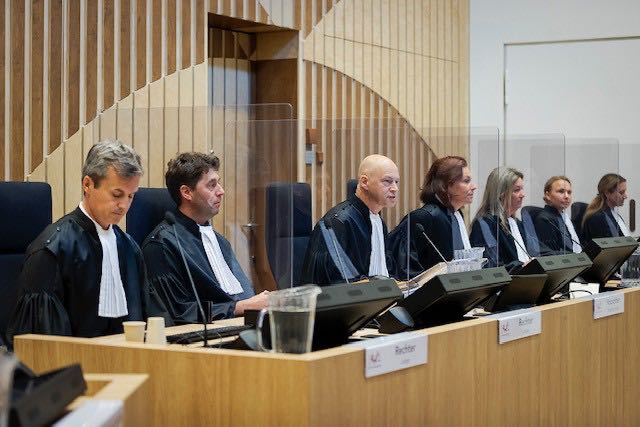 Dutch court in session for the trial of four suspects held responsible for the downing of flight MH-17 in 2014. Photo OM.
Dutch court in session for the trial of four suspects held responsible for the downing of flight MH-17 in 2014. Photo OM.
By Bob Deen, Christopher Houtkamp, Hugo Klijn & Monika Sie Dhian Ho
When Russia is in the news it is usually for negative reasons, for example due to reports of internal repression, military provocations, disinformation campaigns or cyberattacks on Western targets. Dutch-Russian relations deteriorated particularly after 2014 due to the annexation of Crimea and the conflict in the east of Ukraine, the downing of MH-17 and undue interference in our internal affairs.In the public debate Russia is often equated with the omnipresent Vladimir Putin pursuing his conservative-nationalist course and attempting to hold on to absolute power, weaken the West and regain major power status.It is no wonder, then, that opinion polls in recent years have shown Dutch public opinion on Russia turning predominantly negative with many people in the Netherlands seeing Russia as a threat.
Russian threat to Europe
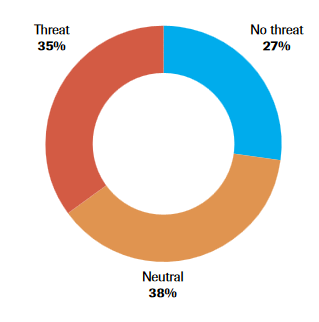
For example, a December 2018 survey conducted by the Pew Research Center showed that of all European countries people in the Netherlands and Sweden have the most critical views of Russia (both 79%, compared to an average of 66%).But such results should be kept under frequent review, as many surveys are just small-scale snapshots or fail to distinguish between different groups of respondents and their views on other subjects. The Dutch population’s threat assessment is ultimately a key indicator of society’s support for government policy towards Russia, NATO and our energy supply.
The Clingendael Foreign Affairs Barometer asked over 23,000 people in the Netherlands to what extent Russia posed a threat to Europe and what they thought about our treaty obligations as NATO members and about Dutch imports of Russian gas. The results of this survey are not as unequivocally negative as those of the Pew survey referred to above: the threat assessment is less severe and differs among sections of society. More than 35% of all participants agree with the statement 'Russia poses a threat to Europe’s security', while 38% have a neutral view or do not know and 27% do not perceive Russia as a threat.
The large proportion of neutral responses is striking
Political orientation and sociocultural attitude
There is a clear correlation between the extent to which Russia is perceived as a threat and three factors: political preferences, sociocultural attitudes and general concern about geopolitical tensions. Other characteristics such as gender, level of education, region or age do not play a significant role. The relatively large proportion of neutral responses is striking. It may indicate that many respondents do not feel sufficiently informed and/or are unsure how to assess a Russian threat.
First, there is a relatively strong correlation between political orientation and attitude towards Russia. VVD, D66, CDA, PvdA and GroenLinks voters view Russia in a significantly more negative light than those with preferences for the PVV, Forum voor Democratie and – to a lesser extent – the SP. The latter parties attract voters who for the most part are less concerned about confrontation with Russia. In the case of the PVV, FvD and SP, for example, this attitude matches those parties’ positioning in the ‘no camp’ in the advisory referendum on the Association Agreement between the EU and Ukraine in April 2016.
It can be concluded from this that public opinions on Russia are now highly polarised, but no longer along the traditional left-right dividing line as at the time of the Cold War. A similar picture also emerges with regard to the newspaper people read – albeit to a lesser extent – with readers of De Telegraaf being almost twice as likely to see Russia as no threat compared to readers of De Volkskrant, Trouw and NRC.
Percentages of party preference and perceived Russian threat to Europe
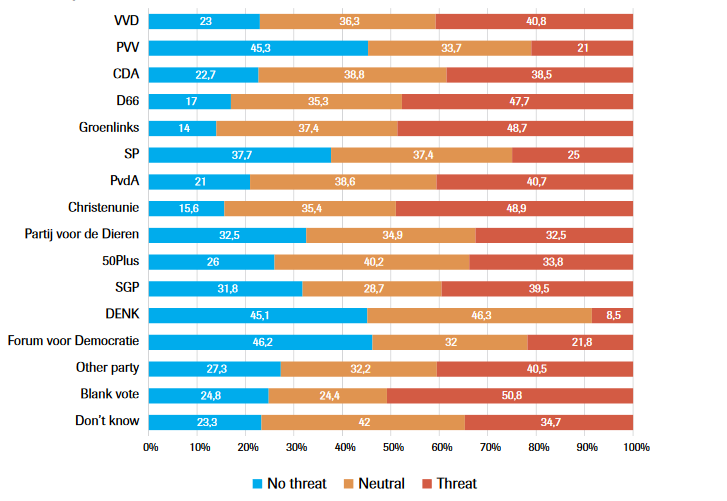
Percentages of preferred newspaper and perceived Russian threat to Europe
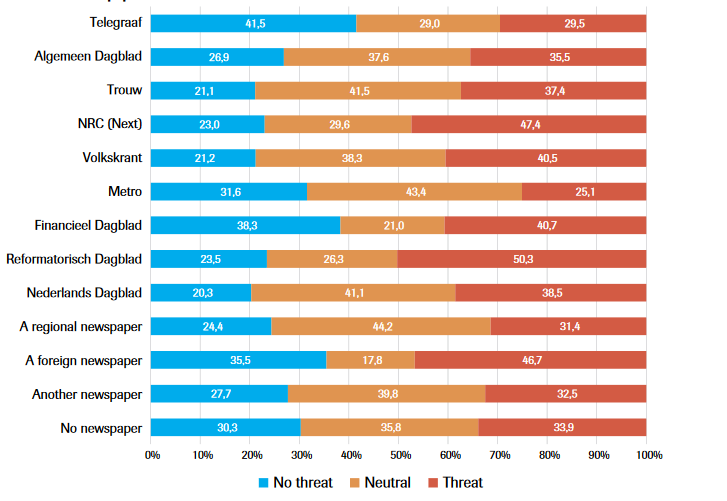
Secondly, the results of the Clingendael Foreign Affairs Barometer point towards people’s sociocultural views as an explanatory variable. They show that people in the Netherlands who set great store by political values such as freedom of speech, and the acceptance of sexual diversity, see Russia as more of a threat. Conversely, it is interesting that people who see a need to protect Dutch culture and have a negative view of migration perceive Russia as less of a threat. This could be explained by the fact that these people feel a certain affinity with the way in which a leader such as President Putin champions socially conservative values and his country’s national culture. Finally, if attitudes towards Russia are compared to other answers in the Foreign Affairs Barometer, a pattern emerges of general concern about growing political tensions and superpower rivalry.
Of the above three factors, it is this pattern that provides the clearest explanation.There is a very strong correlation particularly with regard to China: people worried about a Russian threat often also see China as a threat. To a lesser extent this also applies to the United States. These respondents thus appear to have not so much a traditional 'east versus west' threat perception as a general sense of geopolitical insecurity, with Russia being just one of the causes.
There is a growing awareness that Europe will have to do more to maintain its own security
As well as probing for an overall perception of the Russian threat, the Barometer specifically asked about two other related themes: support for NATO military intervention if one or more allies is attacked by Russia (the 'article 5 mutual defence clause') and the desirability of importing more gas from Russia.
A majority of 56% believe the Netherlands should comply with its treaty agreements in the event of a Russian attack on a NATO member state, while 11% believe it should not have to. It should be noted that this question drew a large number of neutral responses. Furthermore, almost 80% of people in the Netherlands consider the statement 'the United States is less and less willing to protect Europe because Europeans should do more to maintain their own security' to be plausible or even very plausible. This suggests that people in the Netherlands are fairly unanimous on the continued importance of a credible military deterrent, but it also implies a growing awareness that Europe will have to do more to maintain its own security in future.
Dutch support for NATO in the event of a Russian attack
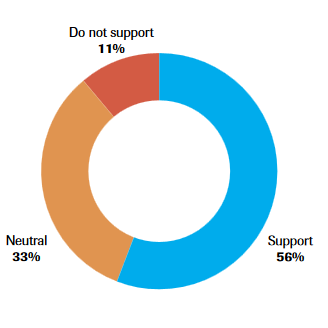
'The US will be less and less willing to protect Europe'
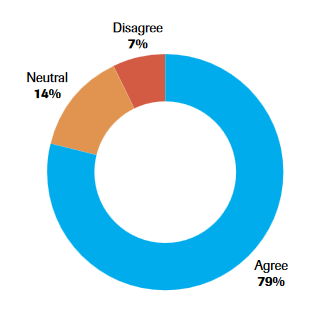
This relative unanimity contrasts with attitudes towards imports of Russian gas, which have long been a subject of social and political debate. According to a recent report by S&P Global these imports are actually set to play a more important role due to the phasing out of gas production in Groningen. Most people in the Netherlands seem to take a fairly pragmatic view of this issue; only 28% of the Dutch population sees it as a problem if the Netherlands imports more Russian gas. Respondents in Groningen, the centre of Dutch gas extraction, do not take a significantly different view than respondents in other provinces.
Only a minority finds imports of more Russian gas a problem
There is a very strong correlation, however, between those who perceive Russia as a threat and those who believe importing more Russian gas would be problematic. As expected there is also a clear correlation between people in the Netherlands who consider the environment and climate to be a policy priority and those who see Russian gas imports as problematic; the latter group presumably sees reduced dependence on Russian gas more as part of an overall energy transition from fossil to sustainable energy.
Support for imports of Russian gas
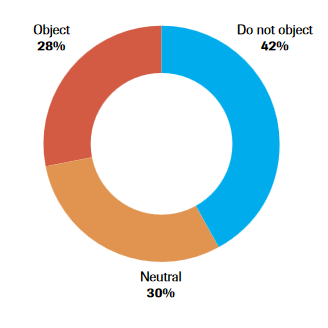
The Dutch government notes a continuing impasse in mutual relations with Russia and for now is adhering to the existing policy, as set out in a letter from Minister Blok to the Dutch House of Representatives of December 2019, which is due to be considered by the House of Representatives at the end of September 2020. This amounts to maintaining pressure on Russia in cooperation with allies, but at the same time seeking opportunities for dialogue and pragmatic cooperation.This twin-track policy actually reflects the divergent views in Dutch society, where neither confrontation nor unconditional rapprochement appear to command broad support.
Interestingly, a recent opinion poll in Russia itself [commissioned by Raam op Rusland] indicates that over 70% of the Russian population has a positive view of the Netherlands, although knowledge of our country is limited. So, regardless of the chilly bilateral relations, the populations of both the Netherlands and Russia appear to see opportunities for rapprochement on a social level as envisaged in the Russia letter.
The Clingendael Barometer nevertheless shows a risk of growing political polarisation of the Russia debate in the Netherlands, along sociocultural dividing lines in society. These dividing lines could be accentuated by heightened tensions following the elections in Belarus, between the Netherlands and the European Union on the one hand and Russia on the other. Minister Blok also notes in the Russia letter that knowledge of Russia has decreased in recent times, which could be a factor in the relatively large number of neutral responses.Consequently, views on Russia, including threat perceptions, may be less fact-based and increasingly susceptible to disinformation. More and better knowledge will in any event improve the quality of the debate and could form a basis for imaginative and future-proof policy.
This is a republication of Barometer Alert by Clingendael, Netherlands Institute of International Relations.
Clingendael has founded a Russia & Eastern Europe Centre which aims to increase knowlegde through analysis, strategic policy advice and events, in close co-operation with Dutch universities and Raam op Rusland.
